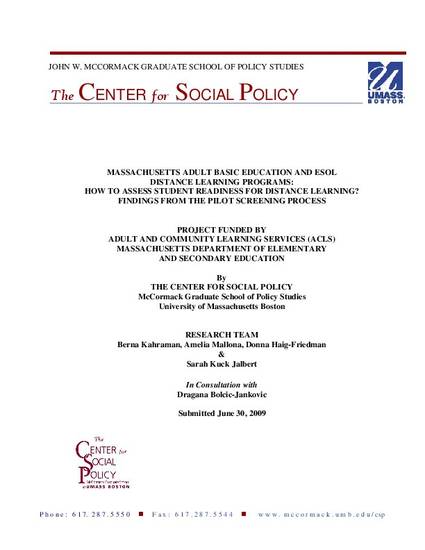
This report presents the findings from the pilot screening process prepared by the Center for Social Policy (CSP) and implemented during December 2008-March 2009 by the adult basic education (ABE) online learning programs in MA which are funded by the Department of Elementary and Secondary Education (ESE). The purposes of the pilot process were:
- To determine the effectiveness of screening tools in assessing participant characteristics, such as the skills, demographics, and life circumstances that are associated with success in online learning;
- To identify supports and interventions which students need in order to persist and succeed in online learning.
At the end of the first round of research during April-August 2008, CSP research team determined that readiness and success of adult students in online learning are embedded indeed in multiple factors both at the individual and the contextual level and these multiple factors are inter-connected with one another. The individual factors include various demographic variables, social characteristics, life situations, learning styles, motivation, computer skills, and cognitive and meta-cognitive skills. The contextual factors include the role of the instructor, the variability and access to the materials and technology being used, the type of program, i.e. GED, Pre-GED and ESOL, the specific requirements of the course being taught and the curriculum design (Petty, Johnston, & Shafer, 2004). CSP researchers developed the Interactive-Constructivist Model of ABE Distance Learning (DL) based on the findings of the first round of research. The Interactive-Constructivist approach conceives learning as a social process. Learning does not happen in a vacuum, but rather in a social context (Kahraman, Mallona, Friedman, Platt, & Kahan, 2008).
Available at: http://works.bepress.com/donna_friedman/8/

Findings from the Pilot Screening Process.